Exclusive interview: Fabian Cancellara
RadioShack leader talks racing, Riis, and rider responsibility
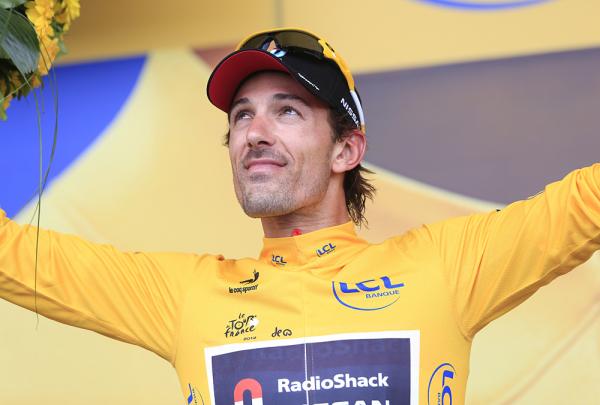
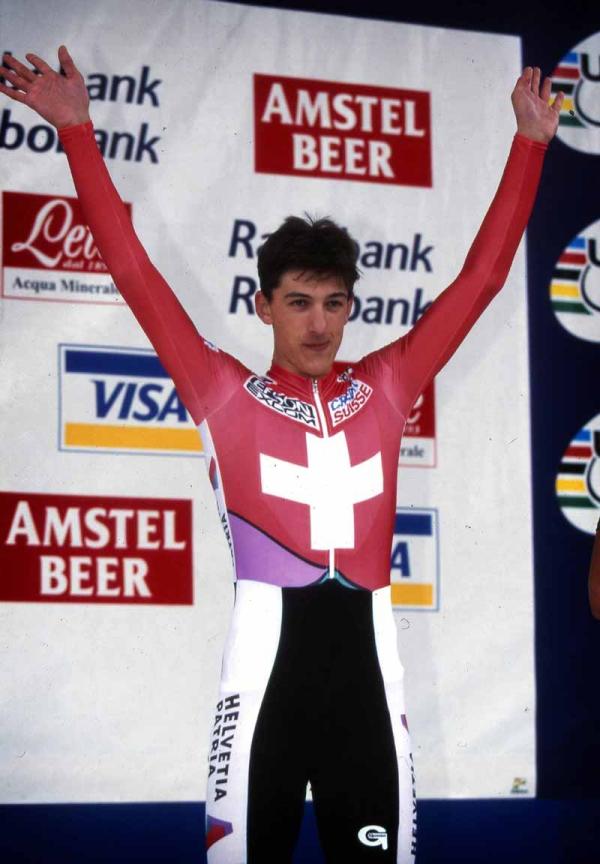
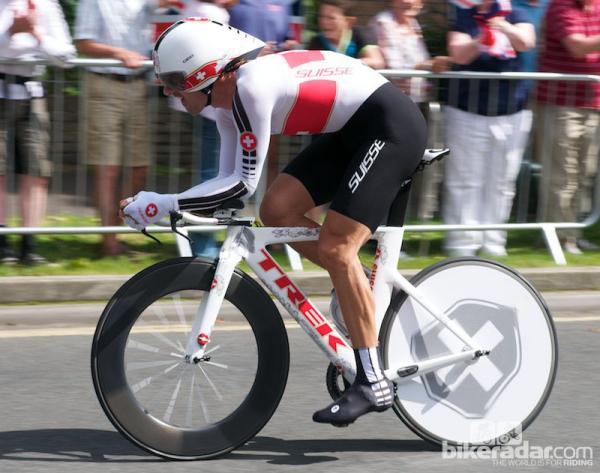
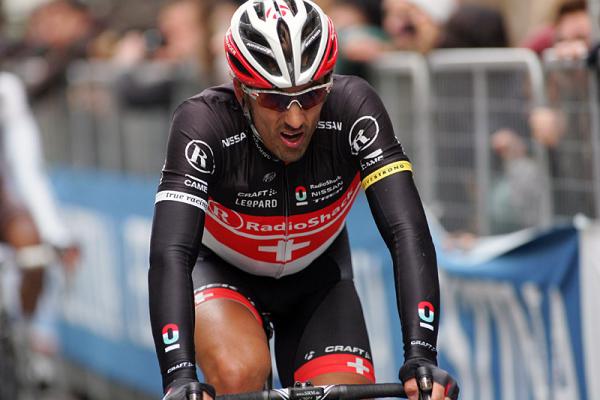
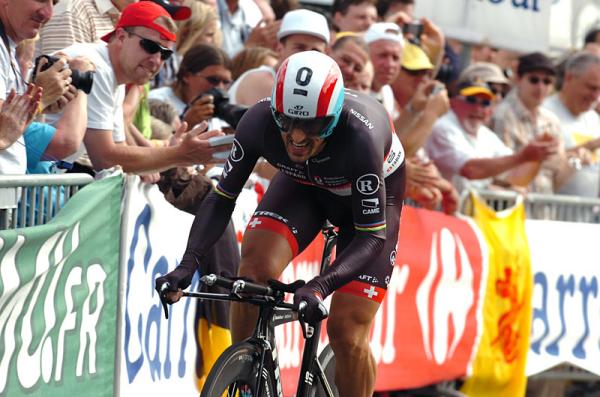
Far from the tumult of Paris-Roubaix's Arenberg Forest, the pressures of the Tour de France or the pain of the time trial world championships, Fabian Cancellara’s 2013 season starts on a nondescript stretch of motorway along the Franco-Swiss border.
Before him are ten months of training, racing and traveling, time away from his family, cramped hotel rooms, overcooked pasta, airport layovers and post-stage traffic jams and prying microphones.
Put like that, Cancellara might well have thought twice before getting into his car for the four and a half hour drive from his home near Bern, Switzerland to RadioShack-Nissan’s first team meeting in the Luxembourg Ardennes. Instead the Swiss rider is upbeat about the trip when he speaks exclusively to Cyclingnews about the season ahead.
The journey of a thousand miles begins with a single step, and Cancellara has a metaphorical spring in his step in spite of – or perhaps even because of – the blighted season he and his RadioShack-Nissan squad endured in 2012.
Cancellara’s personal woes were not of his own making. After powerful showings at Strade Bianche and Milan-San Remo, he was, he says, in the best condition of his career as the cobbled classics approached only for his streak to be halted abruptly by a crash at the Tour of Flanders that left him with a broken collarbone.
Cruelly, the situation would repeat itself at the Olympic Games, when he crashed out of the winning break with no broken bones but a myriad regrets. “The gold medal was there on a plate for me, I’m certain of that,” he tells Cyclingnews wistfully.
In contrast to Cancellara's crashes, the most glaring of RadioShack-Nissan’s litany of wider problems was self-inflicted. Already heavily implicated in the ongoing Lance Armstrong investigation before he took over as team manager last winter, Johan Bruyneel’s status haunted the team throughout the year before the release of USADA’s reasoned decision in October finally forced his departure.
The latest race content, interviews, features, reviews and expert buying guides, direct to your inbox!
For the new season, in a bid to restore order to the team and apparently rehabilitate a severely damaged reputation, team owner Flavio Becca has installed Luca Guercilena as team manager. A product of the late Aldo Sassi’s school at the Mapei Centre, Guercilena went on to work with Paolo Bettini at QuickStep and has been lauded as one of Italian cycling’s most talented coaches and managers of the past decade.
“I know him from our days at Mapei and I’ve always had a good relationship with him,” says Cancellara.
Guercilena received the ultimate vote of confidence from his star man when he was asked to manage the Switzerland cycling team at the London 2012 Olympics. If Cancellara has any reservations about Guercilena’s new role, it’s simply that it might detract from their one-to-one work.
“For the team, for Flavio Becca and for the sponsors, he’s the manager, but for me, above all, he’s the sporting manager who plans my training and follows in the team car,” Cancellara says.
“If he’s able to continue doing the main job that he’s been doing up to now, I don’t think there will be any problems. The only way that there might be issues would be if he constantly gets pulled left, right and centre to go to various meetings. It might be a problem to balance all of that, but I believe in him and I am very happy that he has made this step.”
But does Guercilena, who never raced as a professional, have the necessary charisma and authority to make the transition from trusted aide-de-camp to the man charged with managing the egos and aspirations of 30 riders?
“We’ll see how that goes. We’ve got the first training camp coming up now, and from my point of view, it will be interesting to clarify the questions I have now about his role. But he has a great personality, great credibility and a lot of experience. So we have nothing to lose, that’s how I’d see it.”
Credibility, of course, is the currency which erstwhile manager Johan Bruyneel was so sorely lacking.
His creditors finally lost patience with the release of USADA’s reasoned decision. In reality, the Belgian’s position in the sport should have been untenable from the moment Floyd Landis’ emails landed over two years previously, but he lingered on, even succeeding in welding his RadioShack team unsteadily to Leopard Trek at the end of 2011 and becoming manager to Cancellara, Andy Schleck et al.
“Honestly, I don’t want to talk too much about the past, but we certainly didn’t have an easy year, between my crashes and all the general problems around the team,” Cancellara says of an annus horribilus for RadioShack that also saw Fränk Schleck test positive for Xipamide at the Tour de France.
“Then we had the problems at the end of the year with the Lance Armstrong story and for cycling in general, it wasn’t a nice period. But times have changed and now we’re going to turn the page. 2013 is about to start and we’re all very motivated for that.”
In defence of Riis
While Bruyneel exits stage left, another of Cancellara’s former managers, Bjarne Riis, remains in charge of Saxo-Tinkoff but is fending off accusations made in Tyler Hamilton’s autobiography that he facilitated blood doping under the supervision of Dr. Eufemiano Fuentes during his time at CSC. While Riis confessed to doping as a rider, the claims of a conversion towards the end of his racing days and his supposed desire to manage a clean team ring hollow following the publication of Hamilton’s book.
“I knew Tyler and he wasn’t a bad guy but I don’t know the motives for doing what’s being done now,” Cancellara says. “He comes and talks all over the world and says, ‘this guy brought me here, this guy sent me there’ but at the end of the day, you have to decide for yourself whether you’re going to smoke a cigarette or not. If you’re not capable of saying no, then I’m sorry, but it’s your own fault.”
On the most striking facets of the Riis enigma is the curiously enduring loyalty he commands from riders past and present. For different reasons, Bobby Julich and Brad McGee have penned open letters on cycling’s blood doping era in recent weeks, but each man was careful to defend the reputation of Riis and his work with the CSC team, even if Julich acknowledged that Riis’s handling of the Ivan Basso doping case left much to be desired.
For his part, Cancellara credits Riis with teaching him the tenets of leading a team and he has praise too for the work of Dr. Luigi Cecchini, his trainer during his time at Fassa Bortolo and his early years at CSC, a close friend of Riis and a man who has aroused more than his share of suspicion over the past twenty years.
“I worked with Cecchini and they were great years with him. I had a great training experience and it’s something that I’ve kept with me,” Cancellara says.
Cancellara also defends Riis despite the gravity of the accusations against him, believing the Dane should be allowed to stay in professional cycling.
“Certainly, because in the end, he was one of the few people who went before the people and confessed and said ‘ok, take away my Tour de France’ and we can’t forget that he went on to do a lot of good things after that,” Cancellara says.
“Let’s be honest here – if Bjarne has to leave cycling, I don’t know how many other people who manage teams would have to do the same. We can’t forget how many people there are in cycling today who were riders during the worst years for cycling.”
The idea of an amnesty or a truth and reconciliation commission for cycling is given short shrift by Cancellara, perhaps believing that such measures would ultimately prove unworkable. The example of Julich, one of only two men (thus far) to confess to doping as part of Sky’s new internal policy, is, Cancellara feels, a case in point.
“Bobby Julich could have stayed silent until the day he died, but he was honest and confessed and now he’s gone from Sky,” Cancellara says.
“Personally, I don’t think that policy is correct. Now, everybody is trying to make himself out to be a saint, but I say let’s close the page. The past is the past; these people have a lot of experience and can still play a role in this new, modern cycling.”
Reflections on the Classics
The premise that cycling should simply wade across the Lethe of a supposed Year Zero and forget the sins of its recent past seems a dubious one given the litany of undesirable old ghosts who continue to play active roles in the sport. Cancellara will probably enjoy greater success in his own personal endeavour to exorcise the ill fortune that has plagued his 2012 season.
Cancellara opted to bring the curtain down on his season after the London Olympics and admits that the extended break was badly needed from a mental standpoint. Though his performances often have an other-worldly hue about them, he feels that his Olympic crash was proof that in cycling, nobody is immune to normal human stresses.
“Of course the error on the corner was all mine, but I think that in the end, it was an accumulation of things over the course of the year – the fall in Flanders, the situation in the team and also my private situation, as my wife was pregnant, so of course you spend the whole year thinking about that and planning.”
Cancellara lined up for the time trial the following Wednesday knowing that a defence of his title was impossible. Four months on he prefers to focus on the positives of his seventh place.
“I think I earned a lot of respect for doing that. Winning isn’t always important. Going there and showing that you know how to lose is important. So I went and I still won something that day.”
Moral victories have been an increasing part of Cancellara’s diet over the past two seasons but by and large, he has digested those disappointments with equanimity, perhaps in part because they have still been washed down by a steady flow of tangible achievement.
“This year I won Strade Bianche and set the record as the rider who has spent most days in yellow without ever winning the Tour de France, so in spite of everything I didn’t have a bad year,” he acknowledges.
Even so, it is clear that since his Tour of Flanders and Paris-Roubaix double in 2010, Cancellara’s freedom on the cobbles has been fettered somewhat by his fearsome reputation, a phenomenon best articulated by Jonathan Vaughters’ joking assertion after his win at E3 Harelbeke last year that the only way to stop the Swiss rider was to “hire a sniper.”
Rather than bemoan the heavy marking to which he has been exposed, Cancellara seems almost to revel in it, repeatedly attempting to ride his rivals off his wheel. Victories and WorldTour points may ultimately decide the small print of a riders’ contract but in Cancellara’s mind, the history books often reserve their longest chapters for the grandest gestures.
“I leave all the passion I have for this sport out there on the road. You saw that at Milan-San Remo, there were two guys on my wheel. What did I do? Pull back? No, I did what I always do – I kept going, I went for it. Even though the strongest doesn’t always win, you can’t hold back,” he says of his second place finish behind Simon Gerrans last March.
“Maybe in recent years, I haven’t won that much but in the end, I was still always competitive and always up there. Given my status and what I’ve won already, that’s almost more important for after my career. Sure, winning Flanders, Roubaix and the Worlds is the best, but I’ve already won those races. I won a lot of respect after the classics last year and again after San Remo and the Olympics this year.”
Lest anyone think that Cancellara is focused on entertainment rather than success, he points out that winning races, and not plaudits, is always the ultimate goal. “It’s not spettacolo,” he stresses. “I ride to my limit until I fall off my bike. That’s my spettacolo. I do everything I can to win."
“A lot of people like to see the strongest win all the time, but we know that that sport is not like that. Cycling is not predictable, which is just as well, because otherwise it wouldn’t be such a beautiful sport.”
The responsibilities of a team leader
At the age of 31, Cancellara has been around long enough to have grown immune to the hype and trappings that surround cycling’s grandest events, and while he refuses to be drawn on speculation that he might forgo the Tour de France in 2013, he admits there are more pleasurable races than La Grande Boucle dotted throughout the calendar.
“My programme isn’t fixed. Of course, I have some ideas and we’ll see. I’ve won everything at the Tour that I can possibly win, but in the coming days I’ll sit down and talk with the team about it.”
While Cancellara proudly notes that he has been at the “Champions League level” of cycling without interruption since 2006, he is cold on the concept recently touted by Omega Pharma-QuickStep backer Zdenek Bakala of applying a Champions League-style structure to the racing calendar and the hierarchy of teams.
“I don’t agree because cycling needs small races to support big races. You can have a general overhaul to balance a few things but at the end of the day, we’re eating from the same plate. For me, it’s not right that the Tour de France has such a high standing compared to other races that have a similar level,” Cancellara says. “In the end, if big riders come to smaller races, there’s a lot of publicity for those races and the local sponsors and the crowds come out to see them. It’s not just about the big races.”
For Cancellara, the grand narrative of cycling has been shaped by riders rather than by races, by people rather than by events. “Races are nothing without riders. It’s riders who make the races great by coming there and racing,” he says.
Within the confines of his own team, Cancellara believes in the responsibility of the team leader to act as such at all times. Part of his rationale for ending his season after the Olympics was that it would have been undignified for a leader to turn up to a race and go through the motions. “It didn’t make sense, It would have looked very bad,” he explains.
On the long drive up to Luxembourg, Cancellara seems almost to be steeling himself for what lies ahead, parking his personal disappointments of the past year along the way before he goes to rouse the beleaguered troops. With a team and a sport cast into turmoil by the fall-out of the Lance Armstrong affair, it is a period of potentially great change, and yet for Cancellara, rightly or wrongly, it is simply business as usual.
“I can’t go to this team training camp with my head down,” Cancellara says. “I’ve got a responsibility as a leader and to this team. I have to show the boys that I’m here, I’m ready and I’m still the same rider.”

Barry Ryan was Head of Features at Cyclingnews. He has covered professional cycling since 2010, reporting from the Tour de France, Giro d’Italia and events from Argentina to Japan. His writing has appeared in The Independent, Procycling and Cycling Plus. He is the author of The Ascent: Sean Kelly, Stephen Roche and the Rise of Irish Cycling’s Golden Generation, published by Gill Books.